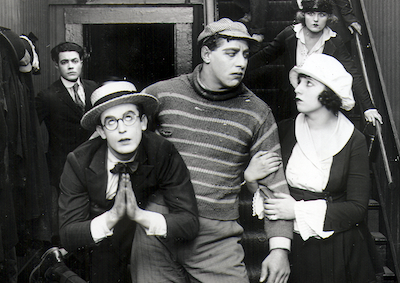Watch on Vimeo
SEPTEMBER 29, 2021 @ 4:00pm (Pacific) The silent film era spans from the invention of motion pictures in 1889 through the widespread adoption of sound recording technologies by 1930. These points of technological change provide a convenient means for demarcating this 40-year period, but it is the art and artistry of silent film practitioners that really define the form. What might be perceived as a limitation from the perspective of today was for the filmmakers of the silent era the essential condition for unparalleled expressiveness that had audiences around the world laughing, crying, dreaming and connecting just as modernity was taking shape. As we contend with our own tumultuous times, films from the silent era—be they towering epics, anarchic comedy shorts, daring dramas, surrealist visions or sober documentaries—still have the power to entertain and enlighten, to speak to us about who we were, who we are and where we might be going.
Ensuring that this utterly unique period of film history remains alive and available to contemporary audiences is why collecting, restoring and exhibiting silent films has been an essential, mission-driven activity of the UCLA Film & Television Archive since its founding more than 50 years ago. It is also why the Archive is thrilled to join dozens of archives, theaters and other allied institutions, along with countless movie fans around the country, to celebrate the first annual National Silent Movie Day on Wednesday, September 29. In deciding how to mark this auspicious occasion for elevating awareness about silent film history, the Archive turned to one of the era’s most recognizable figures whose work has also been a particular focus of its preservation and exhibition programs over the decades: Harold Lloyd. As synonymous with silent comedy as Keaton, Chaplin or the Keystone Cops, Lloyd was a bespectacled on-screen dynamo whose blend of daredevil slapstick, youthful romance and relentless optimism captured the go-getting spirit of a striving America at the outset of the 20th century. The Archive has had the privilege of restoring many of Lloyd’s most influential shorts and features including The Freshman (1925), Girl Shy (1924), Speedy (1928), Welcome Danger (1929) and Safety Last! (1923), with its iconic image of a man—Lloyd—hanging high over a city street from the hands of a clock.
To mark National Silent Movie Day and honor Lloyd’s legacy, the Archive presents three restored shorts, newly scanned from the Archive’s tinted 35mm preservation prints, starring Lloyd alongside two of his most famous leading partners, Bebe Daniels (Bumping into Broadway) and Mildred Davis (Get Out and Get Under, Among Those Present). (Lloyd and Davis eventually married in 1923.)
The program will be introduced by co-organizers of National Silent Movie Day, Brandee B. Cox and Steven K. Hill, with a post-screening conversation between Hill and Lloyd’s granddaughter and friend of the Archive, Suzanne Lloyd.
For more information about National Silent Movie Day, please visit nationalsilentmovieday.org.
Special thanks to: Suzanne Lloyd, Steven K. Hill.
Preservation funded by AFI/NEA Preservation Grants Program and The Stanford Theatre Foundation
Bumping into Broadway
U.S., 1919
Lloyd and Daniels are Broadway aspirants (he pens musical comedies, she treads the boards) who meet cute first in a boarding house, where she’s behind on the rent, and then finally in a speakeasy, where two dozen cops on a rampaging raid stand between him and a brilliantly bashful kiss.
B&W and tinted, silent with musical accompaniment, 26 min. Director: Hal Roach. Screenwriter: Hal Roach, Harold Lloyd, H.M. Walker. With: Harold Lloyd, Bebe Daniels, Harry Pollard.
Preservation funded by The Packard Humanities Institute
Get Out and Get Under
U.S., 1920
Lloyd wakes from a fitful dream—his best girl (Davis) got married without him—late for his big turn in the local play and so races crosstown in his beloved convertible to make the show on time. As mishaps, misunderstandings and general mayhem mount along his route, Lloyd proves that a straight line is the funniest distance between two points.
B&W and tinted, silent with musical accompaniment, 29 min. Director: Hal Roach. Screenwriter: H.M. Walker. With: Harold Lloyd, Mildred Davis, Fred McPherson.
Preservation funded by The Stanford Theatre Foundation
Among Those Present
U.S., 1921
Ambition, class and social mobility are recurring themes in Lloyd’s films with no pretension on any side left un-skewered. Here, he plays a bellhop unwittingly recruited by con artists to impersonate a vacationing British Lord at the estate of a nouveau riche family. Of course, it’s the matron who’s the social climber while dad and daughter (Davis) prefer corned beef to caviar. Lloyd puts on the airs and gets the wind knocked out of him in equal measure—especially in a deliriously extended steeple chase sequence—until it all comes out and true love, once again, proves the quickest path to fortune.
B&W and tinted, silent with musical accompaniment, 43 min. Director: Fred Newmeyer.
Screenwriter: Hal E. Roach, Sam Taylor, H.M. Walker. With: Harold Lloyd, Mildred Davis, Aggie Herring.
All films preserved by the UCLA Film & Television Archive.
Musical accompaniment provided by Cliff Retallick.
